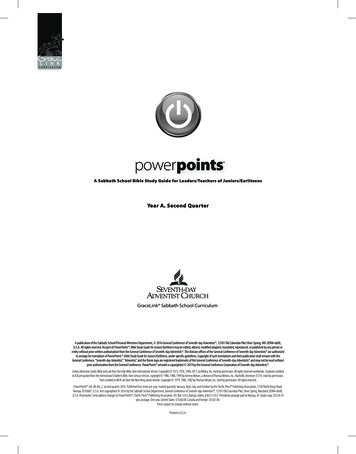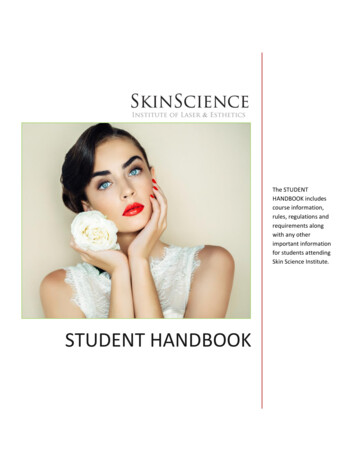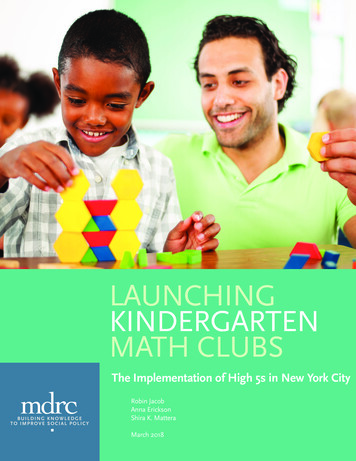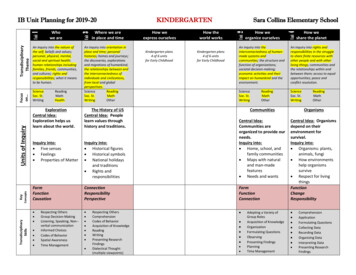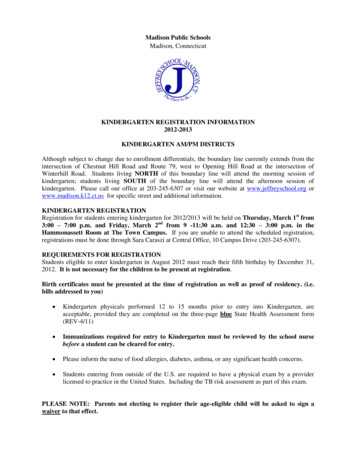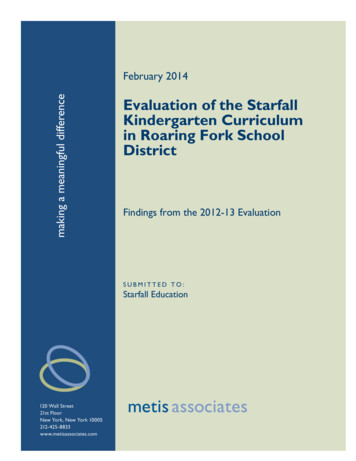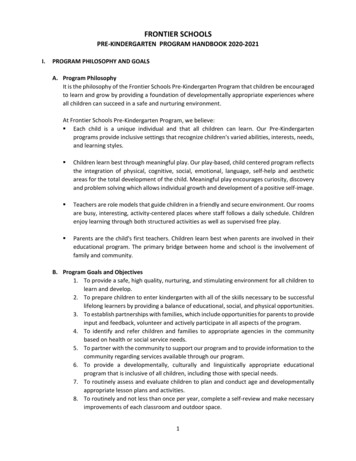
Transcription
FRONTIER SCHOOLSPRE‐KINDERGARTEN PROGRAM HANDBOOK 2020‐2021I.PROGRAM PHILOSOPHY AND GOALSA. Program PhilosophyIt is the philosophy of the Frontier Schools Pre‐Kindergarten Program that children be encouragedto learn and grow by providing a foundation of developmentally appropriate experiences whereall children can succeed in a safe and nurturing environment.At Frontier Schools Pre‐Kindergarten Program, we believe: Each child is a unique individual and that all children can learn. Our Pre‐Kindergartenprograms provide inclusive settings that recognize children's varied abilities, interests, needs,and learning styles. Children learn best through meaningful play. Our play‐based, child centered program reflectsthe integration of physical, cognitive, social, emotional, language, self‐help and aestheticareas for the total development of the child. Meaningful play encourages curiosity, discoveryand problem solving which allows individual growth and development of a positive self‐image. Teachers are role models that guide children in a friendly and secure environment. Our roomsare busy, interesting, activity‐centered places where staff follows a daily schedule. Childrenenjoy learning through both structured activities as well as supervised free play. Parents are the child's first teachers. Children learn best when parents are involved in theireducational program. The primary bridge between home and school is the involvement offamily and community.B. Program Goals and Objectives1. To provide a safe, high quality, nurturing, and stimulating environment for all children tolearn and develop.2. To prepare children to enter kindergarten with all of the skills necessary to be successfullifelong learners by providing a balance of educational, social, and physical opportunities.3. To establish partnerships with families, which include opportunities for parents to provideinput and feedback, volunteer and actively participate in all aspects of the program.4. To identify and refer children and families to appropriate agencies in the communitybased on health or social service needs.5. To partner with the community to support our program and to provide information to thecommunity regarding services available through our program.6. To provide a developmentally, culturally and linguistically appropriate educationalprogram that is inclusive of all children, including those with special needs.7. To routinely assess and evaluate children to plan and conduct age and developmentallyappropriate lesson plans and activities.8. To routinely and not less than once per year, complete a self‐review and make necessaryimprovements of each classroom and outdoor space.1
9. To provide wholesome, nutritious meals and snacks that meet the federal Child Care Foodprogram guidelines and are culturally and developmentally appropriate.10. To invest in staff by identifying and providing training and professional developmentopportunities.II. GENERAL INFORMATIONA. Ages ServedFrontier Schools provide a developmentally appropriate Pre‐Kindergarten and kindergartenreadiness program for children ages 4 to 5 years or until entering kindergarten. Enrolling childrenmust be 4 on or before September 1st of the current program year.B. Inclusion of All ChildrenFrontier Schools values diversity and welcomes all children without regard to race, color, nationalorigin, creed, religion, gender, disability, or handicap. Children are accepted into Frontier Schools’Pre‐Kindergarten Program as long as we are able to provide a program and atmosphere that meetthe needs of the child and the other children enrolled; the child must not be a danger to himselfor other children or adults. Each child admitted must be determined to be ready for the Pre‐Kindergarten group experience and able to benefit from the program offered. Frontier Schoolswill make reasonable accommodations for children with disabilities and special needs asdescribed by the Americans with Disabilities Act.C. Days and Hours of OperationOur Pre‐Kindergarten program operates on the same calendar of Frontier Schools K‐12 program(from August to May). The Pre‐Kindergarten program will close on the same dates as the K‐12educational program. School is open Monday‐Friday, 7:30 AM to 4:00 PM. Parents will receiveexact program start and end times in August.D. TransportationFrontier Schools provides transportation for the Pre‐Kindergarten program students.E. Teacher QualificationPre‐Kindergarten program teachers hold a valid teaching certificate issued by the MissouriDepartment of Elementary and Secondary Education (DESE).III. ENROLLMENT PROCEDURES AND REQUIREMENTSA. Tuition‐Free EligibilityTo be eligible for tuition‐free Pre‐Kindergarten program, your child must meet the followingcriteria listed below. Reside within the boundaries of the Kansas City Public School DistrictQualify for free and reduced price lunch2
B. Parent Paid TuitionIf the child is not eligible for the tuition‐free Pre‐Kindergarten, the program cost will be 60/schoolday.Frontier Schools’ employees will receive 30% reduced tuition rate for the children enrolled inthe program.A 200 non‐refundable deposit is required to reserve a tuition‐paying Pre‐Kindergarten spot andit is due on April 1. This fee will be applied to the August tuition bill.All tuition payments are due and payable on the 1st day of the month PRIOR to the start of themonth for which your child will receive services. The first tuition payment is due by August 1st,.Payments not honored by your financial institution will result in suspension of services.Reinstatement can occur only after all fees are paid in full and space is available. Continued lateor non‐payment may result in your child’s permanent removal from the Pre‐Kindergartenprogram. A 30.00 late fee will be charged for each week the payment is late. Your balance mustbe paid in full to avoid this late fee. A 25.00 fee will be assessed for all unhonored payments byyour financial institution. No adjustments will be made if the child cannot attend the school forsickness, car problem, etc. All payments are non‐refundable.Families may complete an application through the Child Care Assistance Program by contactingthe Department of Social Services at 855‐373‐4636 or online at dss.mo.gov/cd/childcare ordss.mo.gov and search “child care application”.C. Lottery & Admission ProcessIf capacity of the Pre‐Kindergarten program is insufficient to enroll all pupils who submit atimely application, a computerized lottery will be conducted. If the number of pupils from theapplicant list is equal or less than the opening at a grade level, all applicants on that grade levelwill be admitted.The principal or designee of each campus will conduct the computerized lottery, withsupervision by the superintendent or designee from Frontier’s central office. This ensures thatthe admissions list and the waiting list are selected randomly. Results of the lottery shall becertified by a notary public.The lottery software will fill randomly all available seats allowed by the enrollment cap andcreate a waiting list. As space becomes available, applicants will be called from the waiting listbeginning with applicants with the lowest number assignment.Siblings of currently enrolled students at Frontier Schools will receive a preference at the time ofthe admission lottery. An application is still required and must be submitted before thedeadline. “Sibling” shall mean a biological or legally adopted brother or sister residing in thesame household as the applicant. Cousins, nieces, nephews and unrelated children sharing anaddress with the applicant are not siblings. Sibling enrollment is dependent on available spaceand does not guarantee enrollment of each listed sibling.3
Children of the Frontier Schools’ employees are not exempt from lottery requirements.If a student applies to the program outside of the designated application period, the student willbe placed on a waiting list in the order of the date in which the application is received.D. Enrollment DocumentsTwo proofs of residencyStudent’s current immunization recordStudent’s verification of birth (Birth Certificate)Parent/guardian photo ID (Proof of guardianship, if required)Enrollment form and any other form given by the schoolProof of household income:Two current pay stubsCurrent TANF award letterCurrent SSI verificationUnemployment letterCurrent 1040A tax form with W‐2’s, (employer letter on company letterhead, notarizedletter from employer)Child support letterE. Immunization RecordsFrontier Schools Pre‐Kindergarten Program follows State Immunization Laws and will comply withany changes as they occur. Immunizations must be current in order for your child to remain inschool. If your child has any immunizations after enrollment, you must share currentimmunization records with the school.Missouri Statute 210.003 requires that, “No child shall be permitted to enroll in or attend anypublic, private or parochial day care center or preschool unless such child has been adequatelyimmunized against vaccine preventable childhood illnesses specified by the Department ofHealth.” The school shall also notify the parent or guardian of a child enrolled in or attending theprogram, upon request, of whether there are children currently enrolled in or attending theprogram for whom an immunization exemption has been filed.Failure to comply with the above Missouri immunization laws will result in children being held outof attendance and could result in termination of services. Check with your local health departmentfor information on free immunizations.F. Removal of Students Ineligible to AttendThe superintendent or designee will investigate any information LEA receives indicating that astudent is not a resident of the charter district or not otherwise entitled to attend the district inaccordance with law or this policy. If the superintendent or designee determines after theinvestigation that the student is not a resident of the district and is not otherwise entitled toenroll in and attend LEA in accordance with law and the LEA’s policy, the district will notify thestudent's parents/guardians, ask them to withdraw the student by a specific date, and offer theparents/guardians a hearing. If the parents/guardians do not request a hearing by the specified4
deadline and do not withdraw the student, Frontier Schools will formally remove the studentfrom its rolls and notify the parents/guardians that the student may no longer attend school inthe district.G. Admission Process for Kindergarten of Returning Pre‐Kindergarten Program StudentsReturning students (students who currently attend Frontier Schools Pre‐Kindergarten Programand intend to start the Kindergarten next school year) are exempt from the lotteryif they notify the LEA of their intent to return for the next school year by the deadline established by the LEA for Kindergarten.IV. ATTENDANCE INFORMATIONA. The Importance of Daily AttendanceThe Pre‐Kindergarten school year can be the most productive learning year in a child’s life. It is atime of vast brain development. The brains of Pre‐Kindergarten students are working to createorganization through consistency. It is essential that routines and limits for Pre‐Kindergartenchildren be established and are adhered to. That is why the consistency of regular attendance isso important.Children are born ready to learn. They cultivate 85 percent of their intellect, personality and skillsby age 5. Research shows that the long‐term effects of early education on a child’s social andemotional development may be the most important outcome of a high‐quality Pre‐Kindergarteneducation. Unless children attend the Pre‐Kindergarten program on a regular basis, they are notlikely to benefit fully from all the enriching experiences and learning opportunities.Make sure your child receives all the benefits that Frontier Schools’ hig‐quality Pre‐Kindergartenprogram has to offer, such as: Language and literacy skills Letter recognition and writing skills Math and Science concepts Social Emotional skills Cognitive development Enthusiasm for lifelong learning Strong home to school connectionB. What can I do to ensure my child attends daily? Make a commitment to have your child attend school every day, on time. If your child is reluctant to come to preschool, be sure to communicate this to the teacher.Together, you can make plans to address the concerns of your child. Make sure your child has a daily predictable routine, including a routine for bedtime andwaking up in the morning. Be sure to allow enough time for the routines so you and your child do not feel rushed. Have your child get a good night’s rest to make sure he/she has enough energy toparticipate in classroom activities.5
When talking with your child, be positive about school and the teaching staff. Cultivateyour child’s interest in discovering new things and his or her love of learning.Remember, by bringing your child to school every day, you are helping to ensure that heor she will live up to their full potential and become a successful lifelong learner.C. Attendance RequirementStudents may be excused for temporary absence resulting from any cause acceptable to thePrincipal or Assistant Principal. Parents must provide a written explanation for their student’sabsence to be considered as an excused absence. Parent excuse notes may not exceed 5 dayswithin a school year. The excuse will be filed in the attendance office and become part of thestudent’s record.Examined on a case‐by‐case basis; 10 days of unexcused absence in a semester that are notcommunicated with the school, will result in immediate withdrawal from school.V. STUDENT CODE OF CONDUCTA. General Information & ProceduresTo function properly, education must provide an equal learning opportunity for all students byrecognizing, valuing, and addressing the individual needs of every student. In addition to theregular curriculum, principles and practices of good citizenship must also be taught and modeledby school staff. This includes an appreciation for the rights of others. Frontier Schools iscommitted to helping every student fulfill his or her intellectual, social, physical, and emotionalpotential. To foster an orderly and distraction‐free environment, Frontier Schools hasestablished this Student Code of Conduct (“the Code”). The Code outlines prohibited behaviorsand consequences for such behavior. Frontier Schools has the responsibility and authority toenforce the Code, question students, counsel them, and assign discipline when appropriate.The Code does not define all types and aspects of student behavior. The Board of Directors andthe Superintendent may establish written policies, rules, and regulations of general applicationgoverning student conduct in all schools. In addition, each Principal, within his or her ownschool, may establish certain rules and regulations not inconsistent with those established bythe Board and the Superintendent.All the Student Code of Conduct policies and procedures in the Frontier Schools Parent andStudents Handbook for K‐12 program is applicable for the Pre‐Kindergarten program as well.Please visit school web site to download a copy of the handbook for K‐12 program.VI. PRE‐KINDERGARTEN PROGRAM DISCIPLINE POLICYFrontier Schools discipline policy is established to promote student development of autonomy, self‐regulation, self‐respect, and respect for others and their property.1) Discipline Principlesa) Frontier schools Pre‐Kindergarten discipline policies reinforce Dr. Dan Gartrell’s (2004) sevenprinciples for developmentally appropriate guidance:6
1) Principle One: The teacher uses guidance in order to teach children democratic life skills.2) Principle Two: The teacher regards classroom conflicts as mistaken behavior and usesconflicts as teaching opportunities.3) Principle Three: The teacher builds and maintains an encouraging classroom in which allchildren feel welcome as fully participating members.4) Principle Four: The teacher implements developmentally appropriate practice to preventinstitution‐caused mistaken behavior.5) Principle Five: The teacher seeks to understand the reasons for child’s behavior.6) Principle Six: The teacher relies on comprehensive guidance when children show seriousmistaken behavior.7) Principle Seven: The teacher functions as a professional rather than a technician and learnseven while he/she teaches.b) Preventative1) Teachers will explicitly teach and review school‐wide expectations using positive languagethat promotes the encouraged behaviors.2) Teachers will teach and review social and emotional skills required to be a contributingmember of the classroom community.3) Teachers will use clear, consistent, and supportive guidance.c) Classroom Challenges1) I am respectful. (I treat others the way I want to be treated.)2) I am responsible. (I do what is right all by myself.)3) I am safe. (I follow safety procedures.)4) I am smart. (I participate and try my best.)d) Classroom Rules1) It is never okay to be disruptive or hurtful.2) It is always okay to be helpful and kind.e) Teacher Guidance Practicesa. Distraction: The teacher provides a distraction to attract the attention of the child.b. Redirection: The teacher suggests a desirable alternative that allows the child to move froma problematic action to a positive one.c. Positive Language: The teacher uses language that promotes the desired behaviors whilehelping to establish a caring relationship between teacher and child.d. Body Placement: The teacher will place themselves near the child when giving directions orresolving conflict in order to increase the child’s ability to focus their attention on what isbeing said.e. Provide Acceptable Choices: The teacher will provide acceptable choices when possible andaccept the child’s choice.f. Encourage, Support, and Model Negotiation Skills: The teacher will utilize conflict as anopportunity to teach problem solving and necessary conflict resolution skills/behaviors.g. Consider Child’s Development: The teacher will consider the developmental level,maturity, and experience in their expectations and interactions with children.7
h. Use “I” Messages/Avoid “You” Messages: The teacher avoids authoritarian insistence onobedience and provides the child with an objective explanation of the problem beforeasking for the child’s ideas for resolving the problem.2) Major Infractions (Unsafe or hurtful behaviors.)a) Recovery Corner1) When a child is unable or unready to begin the behavior resolution process, they may beasked to take some time out in the recovery corner.b) The recovery corner is a safe place where the child can deescalate.c) The recovery corner is an environment for problem solving rather than punishment.d) The teacher will process with the student once they are physically and emotionally ready/able.e) Teacher processing promotes positive/desired behaviors, problem solving, and conflictresolution.3) Recurring Infractionsa) Parent Call‐ The child’s parent may be called to communicate the problematic behavior andseek parental support in promoting desired behaviors.b) Parent Conference/Behavior Plan‐ If a problematic behavior persists after other interventionshave failed, the parent will be called to attend a conference for the development of anindividualized behavior plan.VII. PARENT INVOLVEMENT & OTHER IMPORTANT NOTICESA. General Information & ProceduresA student’s education succeeds best when there is a strong partnership between home andschool, a partnership that thrives on communication. Your involvement in this partnership mayinclude:1. Encouraging your student to put a high priority on education and working with your studenton a daily basis to make the most of the educational opportunities the school provides.2. Becoming familiar with all of your student’s school activities and academic programs,including special programs, offered in the school. Discuss with the teacher or Principal anyquestions you may have about the options and opportunities available to your student.3. Monitoring your student’s academic progress and contact teachers as needed.4. Attending scheduled conferences and requesting additional conferences as needed.5. Becoming a school volunteer or participating in campus parent organizations.All the “Especially for Parents” (section 5), “Important Notices” (section 6), dress code (section1) policies and procedures in the Frontier Schools Parent and Students Handbook for K‐12program are applicable for the Pre‐Kindergarten program as well. Please visit school web site todownload a copy of the handbook for K‐12 program.8
B. Disenrollment PolicyFrontier Schools reserves the right to dis‐enroll any Pre‐Kindergarten child, at any time, whenwe believe disenrollment is in the best interest of the child and/or the program. Our first priorityis to provide quality care and early education for all children enrolled in our program but on rareoccasions there may be a need to dis‐enroll a child.9
Our Pre‐Kindergarten program operates on the same calendar of Frontier Schools K‐12 program (from August to May). The Pre‐Kindergarten program will close on the same dates as the K‐12 educational program. School is open Monday‐Friday, 7:30 AM to 4:00 PM. Parents will receive

